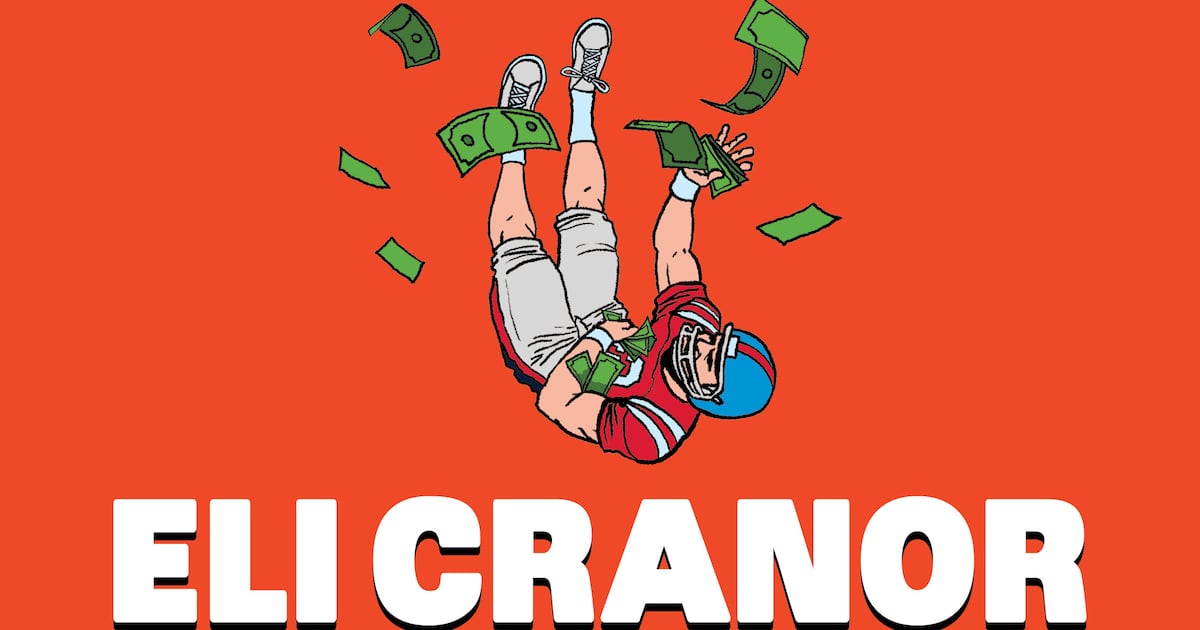How does math enter the equation when an English major is writing about college football? Allow crime novelist Eli Cranor, author of “Mississippi Blue 42,” a college football caper with some sharp cultural observations, to explain.
Asked by Sports Business Journal about the long odds of selling football fans on a novel, Cranor offers a couple of answers as to why this venture is not a literary Hail Mary.
First, he says, “10 million people watch college football every Saturday. If we could get 1% of that viewership to buy this book, then we’ve done really well.” Cranor pauses, then does a quick Google to make sure the numbers add up.
“I’m purely an English guy,” he says, referring to his academic pedigree. Eyeing the results, he adds, “That’s 100,000 in sales.”
As for a backup, or reinforcement, plan? His main protagonist is a headstrong female FBI agent who knows football inside and out. A lot of her pluck comes from Cranor’s wife — and a bit of book-selling pragmatism. Women, by a large margin, account for the majority of fiction sales.
Below is SBJ’s scouting report on “Mississippi Blue 42.”
The basics: Cranor’s tale of big-time, Deep South college football is set in a fictional Mississippi town at a fictional SEC college during the 2013-14 season. In other words, before NIL, the transfer portal and the College Football Playoff. An FBI rookie, Rae Johnson, the daughter of the head coach of the Arkansas Razorbacks, is paired with a weary veteran agent on the cusp of retirement to ferret out white-collar crime associated with illegally paying top recruits at the powerful University of Central Mississippi. When the star quarterback falls to his death from a campus rooftop bar, followed by a shower of $100 bills, a parade of corrupt politicians and policemen, compromised coaches and players, besotted fans and hangers-on are swept up in a satirical tale that pokes fun and points fingers at the spectacle of the game while the FBI agents try to avoid collateral damage. Rae is a former pole vaulter at Arkansas who grew up on football fields and watching game film with her single-dad football coach. She’s smart, brave — and often impulsively impatient to make her mark straight out of Quantico. Her full first name is “Raider,” bestowed by her father because of the impression that NFL team left on him.
Write what you know: The author played, briefly, for Howard Schnellenberger at Florida Atlantic University as a fourth-string quarterback before transferring to Ouachita Baptist College in Arkadelphia, Ark. There he became the school’s starter, setting several records and earning second-team all-conference honors during his senior season in 2010. That led to a one-year stint playing professionally in Sweden before returning to the U.S. to coach high school football before pursuing creative writing. “Mississippi Blue 42” is his fourth novel.
Mississippi in mind: Southern food, culture and football enthusiast and writer John T. Edge, host of SEC Network’s Emmy-winning “TrueSouth” travelogue show, provided counsel on depicting the Magnolia State. Cranor credits Edge with helping him portray the Delta in all its shabby splendor, lending cinema verité and cameos by the likes of Morgan Freeman’s real-life Ground Zero Blues Club in Clarksdale (where legend has it Robert Johnson sold his soul to the devil at the crossroads). Give Cranor a two-point conversion for naming his fictional college program’s home field Sutpen Stadium and the town Compson, Miss.: Thomas Sutpen is the lead character in William Faulkner’s novel “Absalom, Absalom!”, while Compson is the surname of a family featured in Faulkner’s “The Sound and the Fury” and other works set in Yoknapatawpha County (Faulkner’s fictionalized version of Oxford, Miss., home of Ole Miss).
You don’t read fiction … : If you like mysteries, you’re going to like this book. And even if you don’t, any college football fan will find plenty to enjoy. Cranor nails the excesses and vanities of the sport while showing why so many people love the game despite greed, violence and too-often disposable players. From the “ESPN analysts in slim-fit suits and high-top sneakers” to the Waffle House meet-ups where players collect their payments from so-called bag men, and on to imperious, multimillion-dollar head coaches slinging dunderheaded (and plagiarized) locker-room speeches, Cranor spares no one. But somehow — maybe it’s the star player held hostage in his hotel room during the Cotton Bowl by a gun-toting kidnapper wearing Brutus the Buckeye’s mascot costume — the author always lets you know he can’t resist autumn Saturdays any more than the rest of us. And, just as the plot looks like it’s headed for the same schmaltzy finish that most fictional football forays end on, Cranor calls one hell of an audible. Dan Jenkins, from his eternal press box, must be nodding with approval.
 Author Cranor is already planning a sequel set in the contemporary NIL era of college football. Heath Whorton
Author Cranor is already planning a sequel set in the contemporary NIL era of college football. Heath Whorton
Sample passage: “Rae knew, firsthand, the importance of college football in small Southern towns like Compson, or even back in Fayetteville. The Razorbacks were the closest thing to a professional sports team the Natural State had to offer. Arkansas didn’t make it into the national media much, not unless some meth head got loose in a Walmart or her daddy’s Hogs were playing. The emotional wellbeing of the entire state depended on how well the University of Arkansas’s football team performed. It wasn’t like that everywhere, but in states like Arkansas or Mississippi, the games were more than games. They were everything, the only thing.”
Sales blitz: Soho Crime has rarely dipped into sports-related fiction, but the publisher’s lead publicist, Paul Oliver, tells SBJ that Cranor’s authenticity as both a novelist and a former player ring true — and will give the book an extended shelf life through the upcoming college football season. Soho started its release campaign with a decidedly different reader sweepstakes (giveaways included a Nomad Grill and Smoker and Cranor-autographed footballs) this month, and Oliver is on the lookout for football weekend tie-ins as player compensation and other themes of “Mississippi Blue 42” continue to resonate.
Erik Spanberg writes for the Charlotte Business Journal, an affiliated publication.
